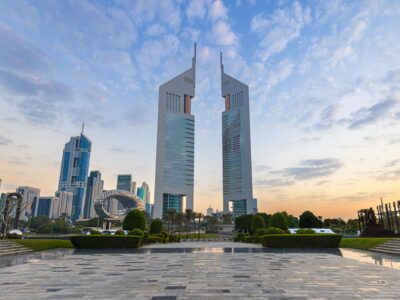Inflation in the United Arab Emirates, which pegs its currency to the dollar, is stabilising and likely US interest rate hikes will lift the ailing greenback, the UAE central bank governor said on Sunday.
Speaking to newswire Reuters on the sidelines of the annual central bankers’ meeting in Basel, Sultan Nasser Al-Suweidi said Gulf Arab oil producers are “very firm” concerning their dollar pegs and have no plans to revalue their currencies.
Inflation in the UAE hit 11.1 percent in 2007, its highest level in at least 20 years. Price rises are accelerating across the world’s biggest oil-exporting region, where economies are booming on a seven-fold rise in oil prices since 2002.
While inflation is rising globally due to surging food and energy prices, Al-Suweidi said inflation is steadying in his country now.
“It is stabilising now. That’s good news,” he said ahead on the sidelines of the Bank for International Settlements meeting.
The UAE does not release monthly inflation data. Inflation in top global oil exporter Saudi Arabia was 10.4 percent in May, easing slightly from 10.5 percent a month earlier.
The Gulf region is struggling to control soaring inflation as higher oil prices spur rapid economic growth and currency pegs to a globally weak dollar fuel import price inflation.
A dollar peg means the region has very limited ways to control inflation as central banks follow the monetary policy of the United States, where the Federal Reserve has slashed interest rates since the global credit bubble popped last year.
Gulf cuts in tandem with the Fed have pushed real interest rates into negative territory across the region and spurred demand for credit.
However, Al-Suweidi said the dollar was likely to rise in the near term and there was no change in the region’s exchange rate policy.
“We are firm on the peg, there’s no revaluation. We are very firm. We see that inflation is causing the United States to raise interest rates in the near future and that’s going to take the dollar up. So why do anything opposite to what is good for us?”
Kuwait broke ranks with the UAE and four other Gulf states last year by severing its link to the dollar, which it said was driving imported inflation. It has since allowed the dinar to rise more than 9 percent.
As the dollar plunged to repeated record troughs against the euro and a basket of major currencies this year and last, investors began betting the UAE and Qatar may follow Kuwait’s lead to fight inflation.
But reform bets have receded since April as Gulf rulers closed ranks, saying they had no plans to drop their pegs or revalue their currencies ahead of achieving a regional monetary union plan.
Asked about oil prices, which hit record highs above $142 a barrel on Friday, Al-Suweidi said the high energy costs were a double-edged sword for the UAE.
“Oil prices – we would like to seem them lower… whatever the market can reduce them to. I know [it benefits the UAE] but it creates also other problems.” (Reuters)






